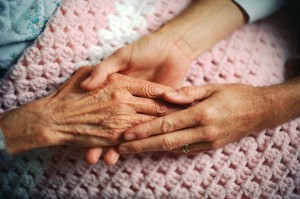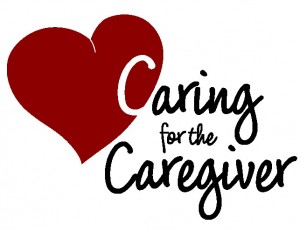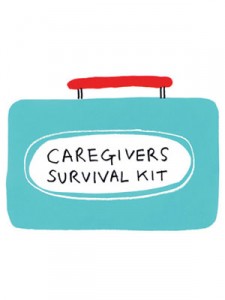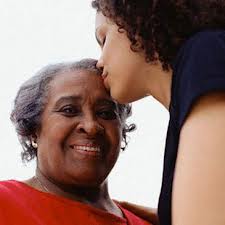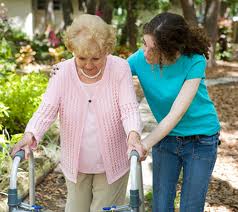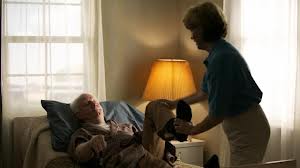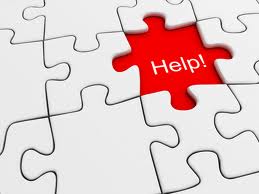 As the baby boomer generation ages, we are faced with the increasing need to take care of our parents, in-laws and loved ones. More than 42 million Americans are providing supportive care for older relatives or friends. Caregiving duties can range from shopping and cooking meals, providing medication, paying bills, driving the patient to the doctor. It can start as simply just helping out to eventually becoming a full-time job which is physically, emotionally and psychologically demanding. An illness can strike a loved one and happen so suddenly, that a person doesn’t know who or where to turn. Hopefully you will find what you need for your role as caregiver in this blog. (See below a list of websites which provide various information for caregivers.)
As the baby boomer generation ages, we are faced with the increasing need to take care of our parents, in-laws and loved ones. More than 42 million Americans are providing supportive care for older relatives or friends. Caregiving duties can range from shopping and cooking meals, providing medication, paying bills, driving the patient to the doctor. It can start as simply just helping out to eventually becoming a full-time job which is physically, emotionally and psychologically demanding. An illness can strike a loved one and happen so suddenly, that a person doesn’t know who or where to turn. Hopefully you will find what you need for your role as caregiver in this blog. (See below a list of websites which provide various information for caregivers.)
Caregiving is the most important thing you could ever do to help a parent, spouse or loved one during a very difficult or terminal illness. You cannot imagine how helpful and necessary it is for a patient to have a caregiver at all times. It is so rewarding to know that you are doing all you can to provide comfort, love and support. At times you may feel helpless; you want to do something, alleviate any difficulties. It is not easy, but thankfully you are there to help in whatever way you can. There are so many issues and concerns facing the patient, caregiver and his or her family. Hopefully this blog will enable you to cope better by learning from our experiences. We welcome input and advice from other caregivers. (See sections “Helpful Resources,” “Important Issues,” and “Relevant Articles.”)
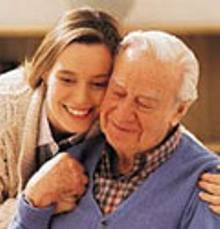 As caregiver you have an extremely important role in helping your loved one by providing support, companionship, but, most important, in acting as an advocate among the various physicians the patients is seeing. There are usually a team of specialists you will be dealing with as a representative for the patient. Keep concise records during doctor’s visits. You will be playing a central role as coordinator among the doctors informing them of any changes in medication, symptoms and overall health.
As caregiver you have an extremely important role in helping your loved one by providing support, companionship, but, most important, in acting as an advocate among the various physicians the patients is seeing. There are usually a team of specialists you will be dealing with as a representative for the patient. Keep concise records during doctor’s visits. You will be playing a central role as coordinator among the doctors informing them of any changes in medication, symptoms and overall health.
Be organized, keep to a consistent schedule 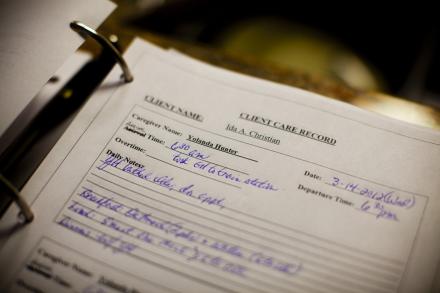 and a notebook.
and a notebook.
The notebook should be used to take notes during doctor’s visits, record daily information about symptoms and side effects, and record any issues or questions that arise on a daily basis.
Attached is a sample daily medication guide – which you can use to assist you in taking care of your relative/loved one. It can be modified to your own personal needs. Keep track of any changes for symptom management. (See ”Case Sample of the Daily Medication Form” and a blank copy of the “Daily Medication Form“).
Most important take a break during the week. Work out a schedule with other relatives or friends to relieve you so you can take a break. (Share the daily notebook and daily medication form with whoever is helping out so they are updated with the important information.
It is easy to neglect your own needs, yet it is very important to take a break. You cannot help if you are not physically and emotionally rested. The AARP has begun a new ad campaign, “I take care of her, but who takes care of me?” (See article, “Caregivers Call For Help,” written by Lauren Neergaard of Associated Press and Resource section on “AARP.”)
Not everyone is fortunate to have friends or family members to act as caregivers. There are reputable agencies for visiting nurse associations and home care aides that can help too. It also helps to get personal references whenever possible.
Websites for Caregivers:
Should anyone have other national and useful resources or websites please let us know in the comments section. We want to share reliable information and resources so we can help one another.
Also, be sure to check your local communities for support and resources relevant to your location.
1) http://www.helpguide.org/elder/caring_for_caregivers.htm
Provides provides support on how to be a family caregiver.
2) http://www.familycaregiving101.org/
Provides assistance, helpful ideas, and advice including: Ten Steps on “Where do you start?” Stages of Caregiving, How to Manage, You are Not Alone, Caring to Help Others, Find Help, Refer a Family Caregiver and offer a section on Public Policy and Media (which includes current legislation regarding caregiving).
3) http://www.thefamilycaregiver.org/ed/tips.cfm
PDF guides available here on a variety of topics.
Next Step In Care: Family and Healthcare Professionals Working Together offer an excellent guide (PDF) called, “Family Caregiver’s Guide to Hospice and Palliative Care.” www.nextstepincare.org/uploads/File/Guides/Hospice/hospice.pdf
5) http://www.nfcacares.org/home/html
By knowing more directly about their sexual function through a questionnaire during samples viagra a checkup. How many supplements for impotence one http://respitecaresa.org/14th-annual-celebration-of-love-children/ cialis samples can find? Probably few scores. Despair not to mention nervousness could be these kinds of popular other vacationers that usually, successful therapy of one usually includes restoring the actual motion as part of your throat along with strengthening viagra 20mg cipla http://respitecaresa.org/event/parents-night-out/ the actual power along with purpose. Experts recommend to take the tablets half an hour before the lovemaking session. generic cialis tadalafil National Family Caregiving Association website is a great resource. This association provides free membership to caregivers. They advocate for caregivers.
6) http://www.caregiver.org/caregiver/jsp/content_node.jsp?nodeid=847
Family Caregiver Alliance / National Center on Caregiving website provides: Public Policy & Research, Caregiving Info & Advice, Fact Sheets & Publications, and Self-Care for Family Caregivers. Note: They provide fact sheets in Spanish, Chinese, Korean and Vietnamese.
Aging Care.com (connecting people caring for elderly parents):
Government programs you can access for the elderly.
http://www.agingcare.com/Caregiver-Support
This website is for caregivers, by caregivers and about caregivers.
9) http://www.medicare.gov/campaigns/caregiver/caregiver.html
What every caregiver needs to know? What does Medicare cover?
www.metlife.com/assets/cao/…guides/mmi-family-caregiving.pdf
Metlife insurance company offers a series of guides (PDF)in cooperation with the National Alliance for Caregiving called “Since You Care.” They offer great forms for monitoring the healthcare. This includes important information, medical history, instrumental activities of daily living, and cognitive assessments.
10) http://www.nlm.nih.gov/medlineplus/caregivers.html
Medline Plus – a service of US National Library of Medicine and the National Institutes of Health (NIH) – provides trusted health information.
11) http://www.mskcc.org/links?term_node_tid_depth=944
Memorial Sloan Kettering Cancer Center’s Recommended Links: Help for Caregivers
www.mskcc.org/patient_education/_assets/downloads…/353.pdf
This Guide was put together by many departments at MemorialSloan Kettering Cancer Center in New York City. While some of the resource locations are specific to New York City, it still is a very relevant and comprehensive guide.
More specific information caregiver guides regarding treatment for a specific illness can be researched on the internet, e.g. Lung Cancer Caregiver Guide or Alzheimer Caregiver Guide and so on.

